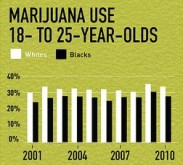This post was written by OK Policy intern Carly Putnam. Carly is an undergraduate at the University of Tulsa majoring in Sociology and Women’s & Gender Studies. She can be found on Twitter at @CarlyPutnam.
A recent ACLU report revea led some disturbing data showing large racial disparities in drug law enforcement. Although Black and White Americans use marijuana at nearly identical rates, Black Americans are disproportionately arrested for possessing it.
led some disturbing data showing large racial disparities in drug law enforcement. Although Black and White Americans use marijuana at nearly identical rates, Black Americans are disproportionately arrested for possessing it.
In Oklahoma, Black residents are nearly three times more likely than White residents to be arrested for marijuana possession; in 2010, Black Oklahomans constituted 7.8 percent of the state population, but accounted for 20.8 percent of marijuana possession. Moreover, Black offenders in the state comprise almost of a quarter of all prison admissions for drug offenses.
 These disparities are not because Black Oklahomans were more likely to use drugs, either. Research by the National Survey on Drug Use and Health found that White Americans are actually more likely to use drugs than Black Americans. For marijuana alone, Black Americans were slightly more likely to report using it in the past year (14 percent, compared to 11.6 percent for White Americans). The small difference in usage was not nearly enough to account for the huge difference in arrest rates. Indeed, for those surveyed ages 18-25, White Americans were more likely than their Black counterparts to report marijuana use.
These disparities are not because Black Oklahomans were more likely to use drugs, either. Research by the National Survey on Drug Use and Health found that White Americans are actually more likely to use drugs than Black Americans. For marijuana alone, Black Americans were slightly more likely to report using it in the past year (14 percent, compared to 11.6 percent for White Americans). The small difference in usage was not nearly enough to account for the huge difference in arrest rates. Indeed, for those surveyed ages 18-25, White Americans were more likely than their Black counterparts to report marijuana use.
High levels of Black incarceration have negative effects for Oklahoma as a whole. It is well-established that a criminal record economically hobbles Oklahoman individuals and families; we’ve written before about the racial discrepancies in key indicators of economic outcomes in the state, and the ACLU notes that criminal records affect individuals’ access to a wide variety of social services and opportunities. Furthermore, other studies and reports have shown racial discrimination in the criminal justice system at all levels (1, 2, 3, 4, 5, 6, 7). As Human Rights Watch has previously argued, the United States’ War on Drugs has been “waged overwhelmingly on Black Americans.”
Unfortunately, statements by Oklahoma law enforcement suggest that they don’t recognize the problem. In Creek County, data indicated that Black residents were nearly six times more likely than white peers to be arrested for possession. Yet Creek County Sherriff Sgt. Les Vaughan told the Tulsa World that he was surprised by the ACLU’s numbers, because “We don’t single them out because they’re black or they’re white, or they’re Indian or Hispanic. Pretty much if we catch you with marijuana, you’re going to jail.”
Similarly, although Kay County’s Black residents are eight times more likely than white residents to be arrested for marijuana possession, nearly triple the state average, Sheriff Everette Van Hoesen told the World that the study data “is not representative of his agency.”
These statements exemplify the popular misconception that racially discriminatory acts can only be generated by deliberate malice. However, the truth is far more complicated. Actions need not be purposefully racist in order to be racially discriminatory. Law enforcement is a stressful, high-stakes job performed by overworked, underappreciated, dedicated officers: Far from actions of deliberate racism on the part of individual officers, the ACLU suggests that regular procedures used by law enforcement nationwide have inadvertent racialized results:
Law enforcement agencies have increasingly shifted their focus from traditional, reactive policing strategies of responding to calls for service and investigation to preventive policing strategies concentrating on low-level, quality-of-life offenses predominantly in communities of color. Police departments have often employed aggressive stop, frisk, and search tactics that bend if not flaunt the Fourth Amendment’s proscriptions. This shift to preemptive policing has likely been a major contributor to the increase in arrests for marijuana possession across the country, particularly in communities of color.
Yet as the ACLU points out, aggressive police actions in these communities has not led to improved public safety. Violent crime rates were no more likely to decrease in communities with large numbers of arrests for marijuana possession than they were elsewhere.
People of color in Oklahoma are handicapped by the criminal justice system in their efforts to build secure futures for themselves and their children. Even if not explicitly racist, our criminal justice system is doing great harm to communities of color through the unacknowledged racial bias of law enforcement tactics. Valuing the intent of law enforcement above the consequences of their actions only perpetuates the inequity. The damage is still done.
There are a variety of options going forward. Racial discrimination need not be an essential element of law enforcement. The American Psychological Association and the Association for Psychological Science both endorse proven methods for eliminating or reducing racial bias in law enforcement without damaging reaction times or placing officers in danger. On a broader scale, writer and activist Michelle Alexander and the ACLU both suggest eliminating the raw numbers-based results systems that incentivize targeting small-scale users and dealers over concentrating resources against kingpins and major distributors. More broadly still, the ACLU also advocates decriminalizing marijuana altogether. But as in all interventions, the greatest hurdle will be to acknowledge that a problem exists in the first place.





 OKPOLICY.ORG
OKPOLICY.ORG


